Jontavious Willis forfeited his bass guitar to sing a capella as he sat in front of a microphone in front of a live audience for Delta State University’s blues conference at the Delta Music Institute in 2021. The Greenville, Ga., singer is known for his blues music, but he is a gospel lover at heart, having sung in his hometown Baptist church’s choir since the age of 3. A slight hum cut through the silence as he began the opening notes to “Trouble In My Way,” a traditional gospel hymn Luther Barnes originally recorded.
“Trouble in my way,” Willis sang.
“Trouble in my way,” the Coahoma Community College Concert Choir echoed in response.
“I have to cry sometimes.”
“I have to cry sometimes,” the choir repeated with an added inflection that only a Black church choir could pull off.
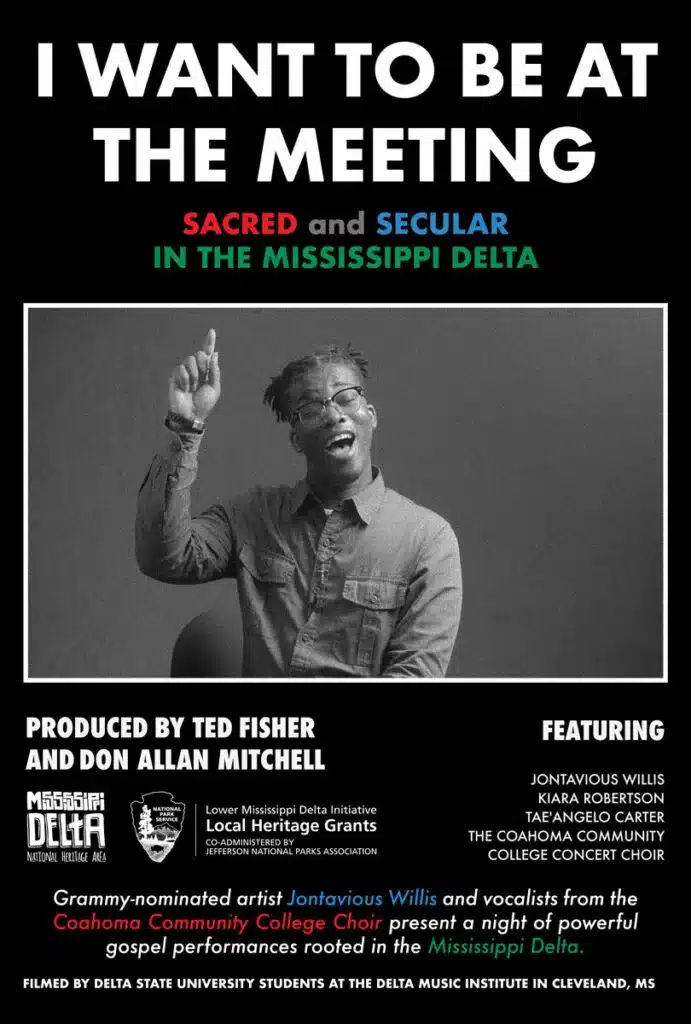
The continued call-and-response between Willis and the choir and clapping from the audience, sitting 60 feet back, adds percussion and rhythm to Willis’ vocals. Without visuals, the rendition has all the makings of a Sunday service inside a Black, rural church with stained-glass windows, gold-plated offering plates, hardwood oak church pews, a choir dressed in church robes, tambourines, an organ player, a drummer and guitarist.
But what’s even more noteworthy are the blues influences that stand out. The somberness in the lyrics expresses sadness and exhaustion but with a touch of hope that giving it to God will fix life’s issues. Blues is characterized by its weighted tone, syncopation, call and response, dissonant harmonies, and melisma. All those elements can also at times be found in gospel music, a cousin of blues.
If it wasn’t established that “Trouble In My Way” was a gospel song, it could function as a blues song. While one is played at church and the other more often at a juke joint, both genres provide cathartic releases for listeners from whatever they may be going through at the time.
Willis’ performance was packaged up in a 30-minute documentary titled “I Want To Be At The Meeting: Sacred and Secular in the Mississippi Delta,” which Delta State University professors Ted Fisher and Don Allen Mitchell produced. The duo are still working out when the film will be released to the masses, but a special screening was shown for students attending the University of Caxias do Sul in Brazil.
The screening was in congruence with the 14th annual Mississippi Delta Blues Festival Brazil, which was themed around B. B. King and took place from Dec. 7 to Dec. 9, 2023. The festival celebrating blues music and Mississippi Delta culture highlights the Magnolia’s States global cultural influence for which it does not always receive credit.
The film also screened at Boomtown Film and Music Festival in Beaumont, Texas on Feb. 24, winning a second place certificate for Best “Reel Faith” Film at the festival. Three students that worked on the film were able to attend the festival as well.
‘An Angel Had Just Come’
Rolando Herts’ parents were music professors and lovers, so he was never without it. His parents were fans of artists such as B. B. King and Bobby ‘Blue’ Bland, and his mom’s favorite artist was Johnnie Taylor, whom she met as a teenager.
“You asked me about the first time (I heard blues music); I can’t think of the first time because it permeates all of my growing up,” Herts told the Mississippi Free Press. “What it makes me think of, if anything, is the stories they shared with me about them growing up in the South and going to juke joints, going to clubs, being around family, eating food, enjoying blues music, playing cards. That’s what all comes to me in terms of impressions of blues.”
Though Herts was born in Illinois, he grew up in Eudora, Ark., which is right across the bridge from Greenville, Miss. His family would often drive to Greenville, which they viewed as their downtown area, giving him a connection to the Delta. He eventually completed a Teach for America job in the Delta at Harvard Elementary School in Indianola and loved the experience.
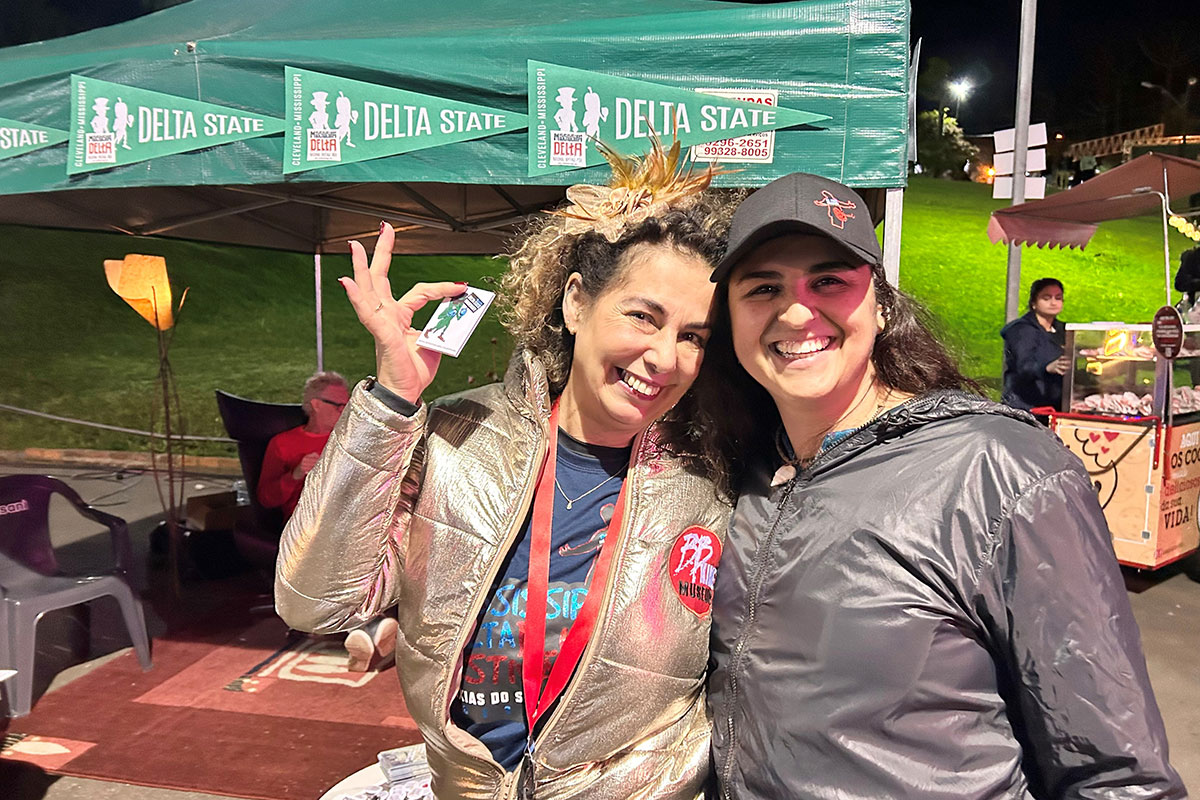
After earning his doctorate, Herts accepted a position at Delta State University as a director for the Delta Interpretive Center, and he never looked back.
“When I first started this job in August of 2014, I went to Brazil in July of 2014, just cause I wanted to go. I loved Brazilian culture,” he said. “I went with a couple of friends, and we went to Salvador, Bahia, which is the Black state of Brazil. There’s a guy there named Randy Ferrell Roberts, and he talks about the connection of blues and samba music.”
Roberts explained that enslaved Africans developed samba music and that samba is seen as an equivalent of blues music because it is the root of all forms of Brazilian music. Similar to blues, upper-class citizens looked down on samba, seeing it as poor people’s music.
In 2019, Herts presented at a National Association for Interpretation conference in Rio. There, a colleague told him about the Mississippi Delta Blues Festival in Brazil and about the Mississippi Delta Blues Bar in Rio.
“I went to the blues bar, and I also went to the festival, and it blew my mind how they were interpreting Mississippi Delta culture and tying it to Brazilian culture and Black culture there,” he said. “The blues bar there is in the Gamboa district of Rio, which was a slave market. There’s actually a Black culture museum for Rio and Brazil. They’re in that neighborhood right close to that blues bar, so there’s a lot of those intersections.”
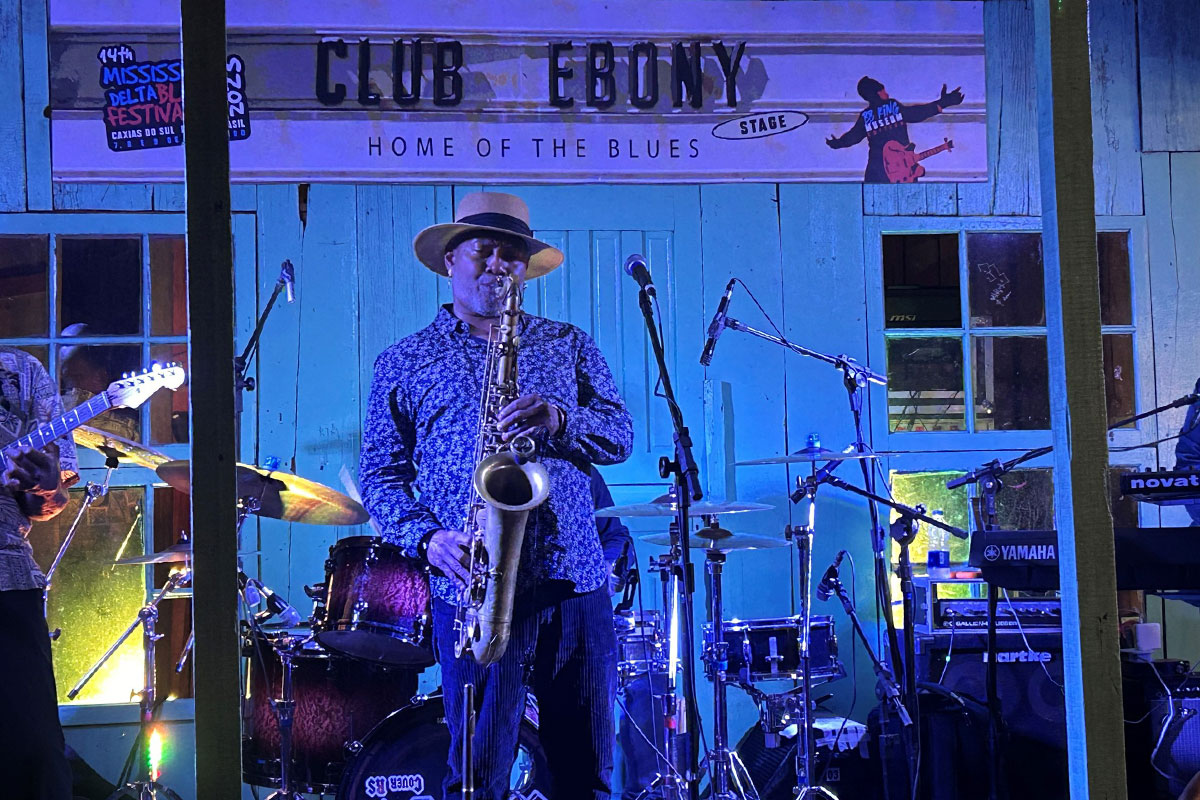
Herts got the opportunity to meet Toyo Bogaso, the blues festival organizer and blues bar owner, and they organically formed a relationship from there. In November 2019, Herts returned to Brazil to attend the festival with Muddy Water’s great nephew Keith Johnson, Delta State colleague Michelle Johanson and photographer Will Jacks for their first Delta Delegation.
“We went to the University of Caxias do Sul and developed an official partnership between that university and Delta State while we were there. The organizer of the blues festival (Bagoso) is a graduate of the University of Caxias do Sul,” the Arkansas native explained.
Since then, the Delta Delegation has returned to the festival every year, with the exception of 2020 and 2021 due to COVID-19 concerns. Each year, the festival’s theme emulates a city in the Delta. The Clarksdale edition took place in 2022, and B. B. King was the central theme for 2023.
Blues singer and B.B. King’s daughter Claudette King performed at the festival, going into the crowd with microphone in hand, and the crowd went crazy, Herts said, noting that she had great energy that he could feel in his brief interaction with her.
“One thing she did, she came over to the tent … and tapped me on the shoulder. It felt like an angel had just come to tap me on the shoulder because I felt her energy. I felt her excitement,” Herts recounted.
“I felt that she felt so very honored that this community recognized the importance of preserving the legacy of her father and of the people of the blues, the culture of the blues, and she said as much there on stage,” he added.
‘Lucille, Club Ebony, Indianola Mississippi Seed’
Mississippi native and B.B. King Museum & Delta Interpretive Center Executive Director Malika Polk-Lee said that in the Delta, blues is a part of native residents’ childhoods. She herself, however, did not become a bigger fan of the genre until she began working at the King museum, which opened in 2012 with the goal of sharing the cultural history of the Delta with the world through arts education and while honoring B. B. King’s life and legacy.
“Once I started working at the museum and got a real appreciation for Mr. King—his life, the life of most blues musicians, the importance of the music to Mississippi history and culture, African American history and culture—then I began to get a real appreciation for the music genre,” Polk-Lee told the Mississippi Free Press.
Polk-Lee said she was not surprised in the least to learn that blues music had such international appeal because B. B. King was an international artist and an ambassador for the blues. Brazil was one of the places that he toured frequently, she said.
“The first partnership we did with them for this Brazil tour was in 2019, and we partnered with them as well as Visit Clarksdale to send artists to this festival,” Polk-Lee said. “We did an additional partnership in 2022 in which we again partnered with Clarksdale, Mississippi National Heritage Delta Area, Delta Culture Center and Delta State to send artists and representation to the festival.”
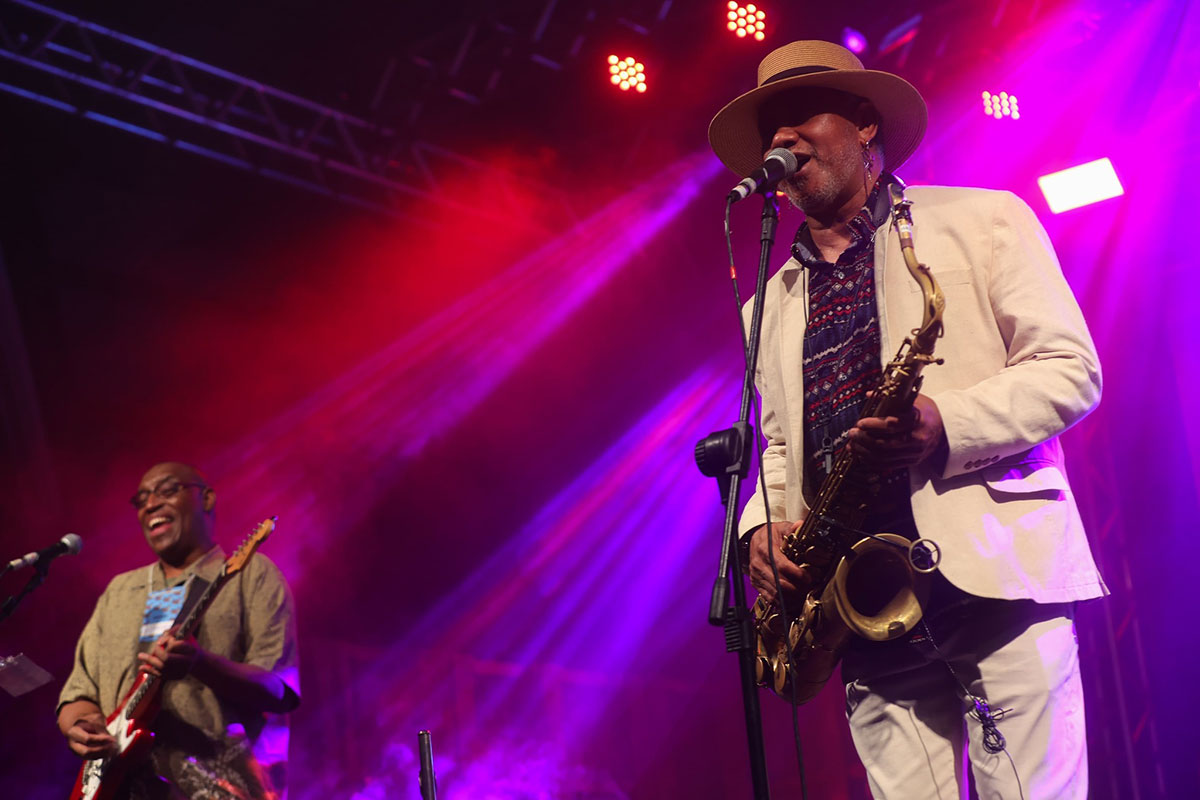
The 14th-annual Mississippi Blues Delta Festival Brazil dubbed the 2023 festival as the B. B. King edition, with stages and musical spaces named in honor of his legacy and the cultural heritage of Indianola, his hometown and where the museum and interpretive center is located. When the festival’s organizers approached the museum for assistance in living up to the chosen theme, Polk-Lee said she felt it was a great opportunity to showcase Mr. King’s ambassadorship and international presence.
“We helped them to think of stage names and design,” the executive director explained. “We also sent them graphic material to help them with their decisions with how to creatively set the scene for the B. B. King Museum. We helped in the logo creation, design and marketing for the standpoint. We sponsored artists.”
The museum sent museum board member, educator and artist Dr. Alphonso Sanders; the museum’s music education director Jimmy Lee Jr.; and Big Time Rhythm and Blues’ Mike Dennis, who won the Indianola Blues Society Championship. Two additional artists, Michael Dennis and Corey Toole, joined Jimmy Lee Jr. to help form the B. B. King Museum Legacy Band for the festival.
“We were excited about the opportunity to showcase our artists and our own,” Polk-Lee said. “Mr. Sanders was there from an education perspective to not only be able to tell and inform people about the B. B. King Museum and what we do here, but also about the history of blues, blues culture, its impact on American music, African American music and so on and so forth.”
Stages for last year’s festival were modeled after B.B. King, Club Ebony, Lucille’s House and the Indianola Mississippi Seed, King’s 18th studio album.
“You can’t do anything about B.B. King if you don’t say ‘Lucille.’ The two go together, so Lucille had to be represented in some way,” Polk-Lee said. “We were really happy that we were able to get some representation for Club Ebony because it has a very powerful story. It’s a historic chitlin circuit club.”
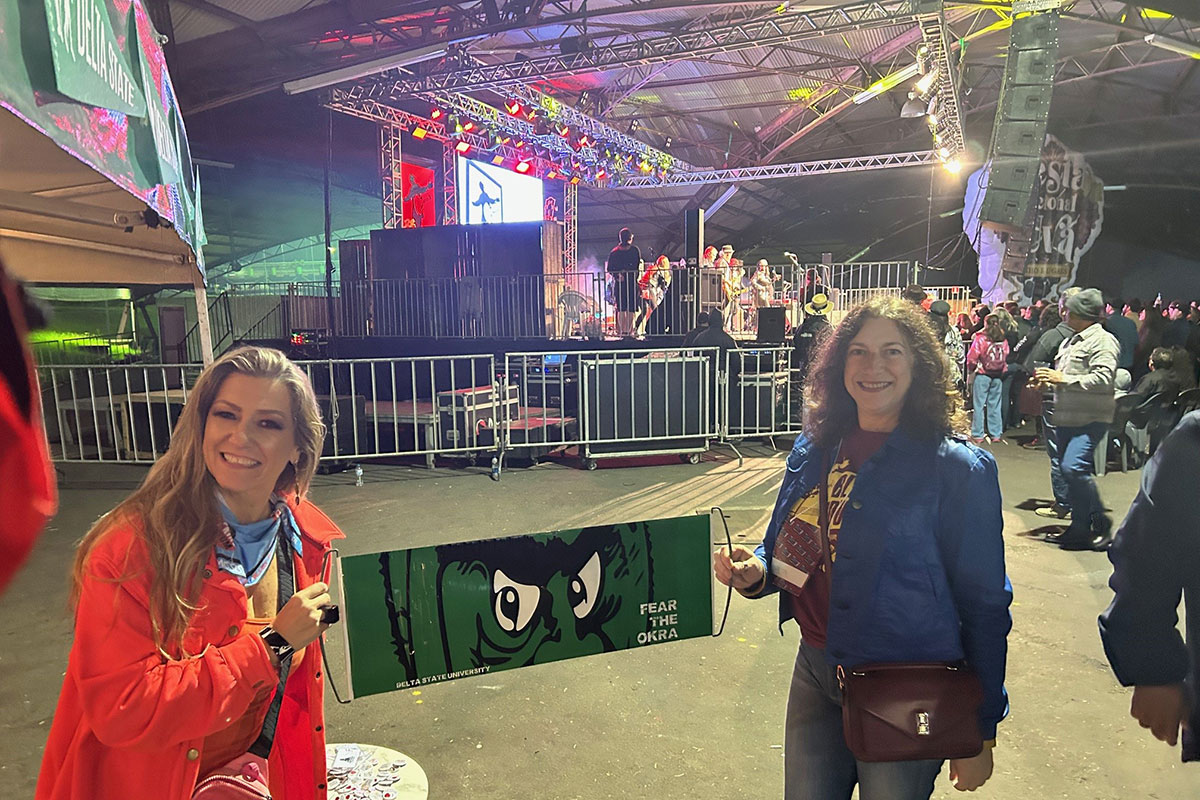
During that era, Club Ebony was where all the greats like B.B. King, Ike and Tina Turner, Ray Charles and others played. Venues like Club Ebony allowed Black artists to connect with their audiences, as they were not allowed to play in white clubs at the time. Chitlin circuit clubs helped African Americans develop their own system and way to showcase artists before the crossover, Polk-Lee explained.
The theme for the 2024 edition of the Mississippi Delta Blues Festival Brazil in November will be Cleveland, Miss., another city in the Delta that is integral to blues history and culture. Being able to showcase Dockery Farms, where blues music was born, is going to be an important part of celebrating and highlighting blues history. The farm also sits between Sunflower and Bolivar counties, which have produced a number of blues artists.
Having cultural exchanges with countries like Brazil helps promote Mississippi and the state’s artistry, combating the aspects of Mississippi that lead other parts of the country and the world to view the state from a negative lens.
“One of the positive aspects of (doing this) is to shed a light on the great genre of music that was birthed in Mississippi and the Delta and the positive impact that it’s had on the world,” Polk-Lee said. “To be able to do that with international branding just reemphasizes how much music has an impact of bringing people together. It shows as much as we are different, we’re alike and can come together when it’s good music.”
‘I Want To Be At The Meeting’
In a similar vein, former Delta State University President William N. LaForge wanted to do an annual blues conference a few years back. Around 2019, Dr. Rolando Herts, Ted Fisher, Don Allen Mitchell and the planning committee began having conversations about expanding the scope of the unnamed conference beyond blues. What they kept circling back to was gospel music’s ties to the genre.
The gospel-themed conference was set for 2020, but, of course, the pandemic delayed the conference for a year. With so much fear still surrounding getting infected at live events, organizers opted to include a streaming option for those who wanted to participate remotely.
“Ted is very much skilled in video and streaming. Part of it was practical. We wanted to have a streaming audience that could log in from anywhere around the world and watch what we were doing,” Delta State University Associate Professor Don Allen Mitchell told the Mississippi Free Press.
The event was also a practical way to teach Delta State film students how to record live-music events. Due to the layout of the room, they avoided filming straight on and ensured that the audience and performers were 60 feet apart for social-distancing purposes.
“The dynamics of the actual filming was interesting to say the least, but we got it done,” Mitchell said. “Ted and I had talked about what we were going to do with this footage after the conference because though people enjoyed it, it had a shelf life.”
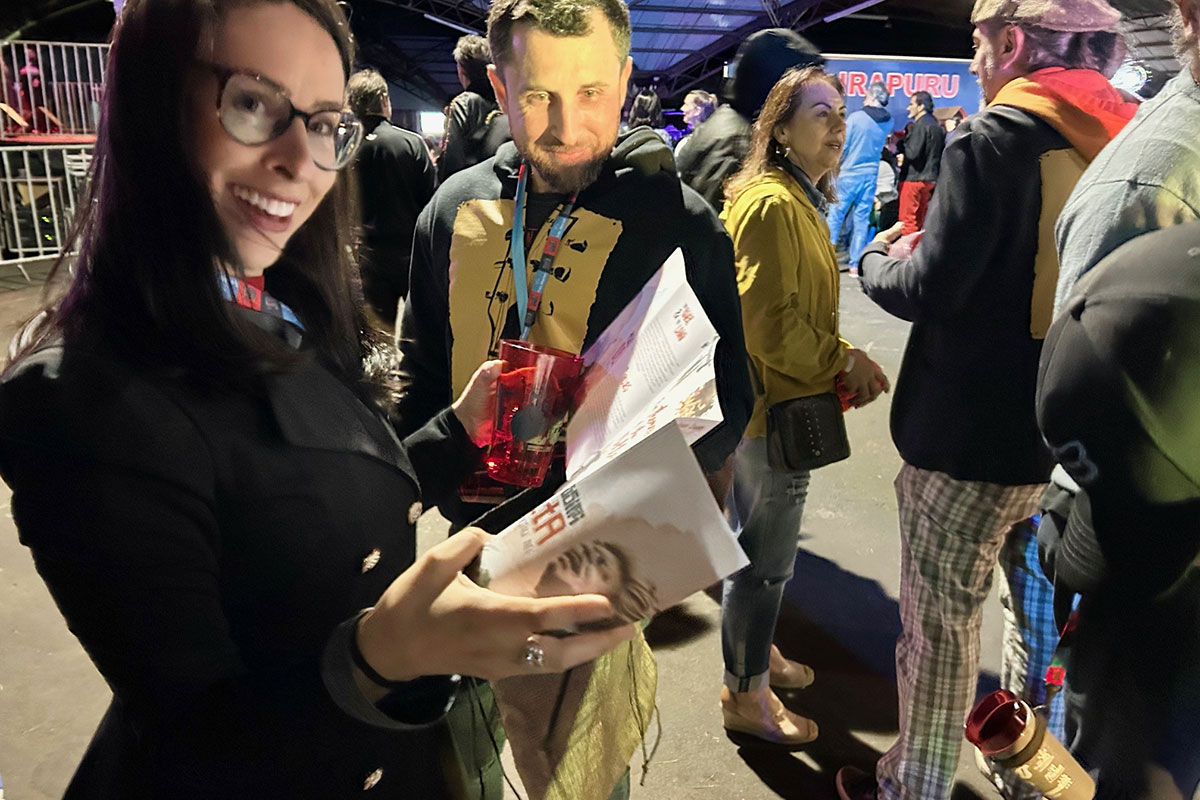
Delta State University Assistant Professor of Art Ted Fisher, who has expertise in video production and documentary filmmaking, explained that they had no budget for what would eventually become “I Want To Be At The Meeting: Sacred and Secular in the Mississippi Delta” and that the process of putting the film together took a lot of improvising.
“If you look at the credits, you’ll see we used a lot of students in this, and that’s great. That’s how they learn,” Fisher told the Mississippi Free Press. “We had one crew of three students on camera, and then another crew switched in, and you can imagine a little bit of chaos there.”
After classes picked back up in the fall, Fisher showed the footage to some of the students to gauge what they did and didn’t like and to determine whether the footage could be turned into something more. Students Mars Kirby and Alice Mullins were editorial consultants, cutting footage together and offering ideas.
“We started from that step, and then as time went by, we had other people actually start to work hands-on with the footage. How could we color correct it? How could it cut together? How’s the sound? This has been a process of class by class of people digging in and spending time with it,” the film professor said.
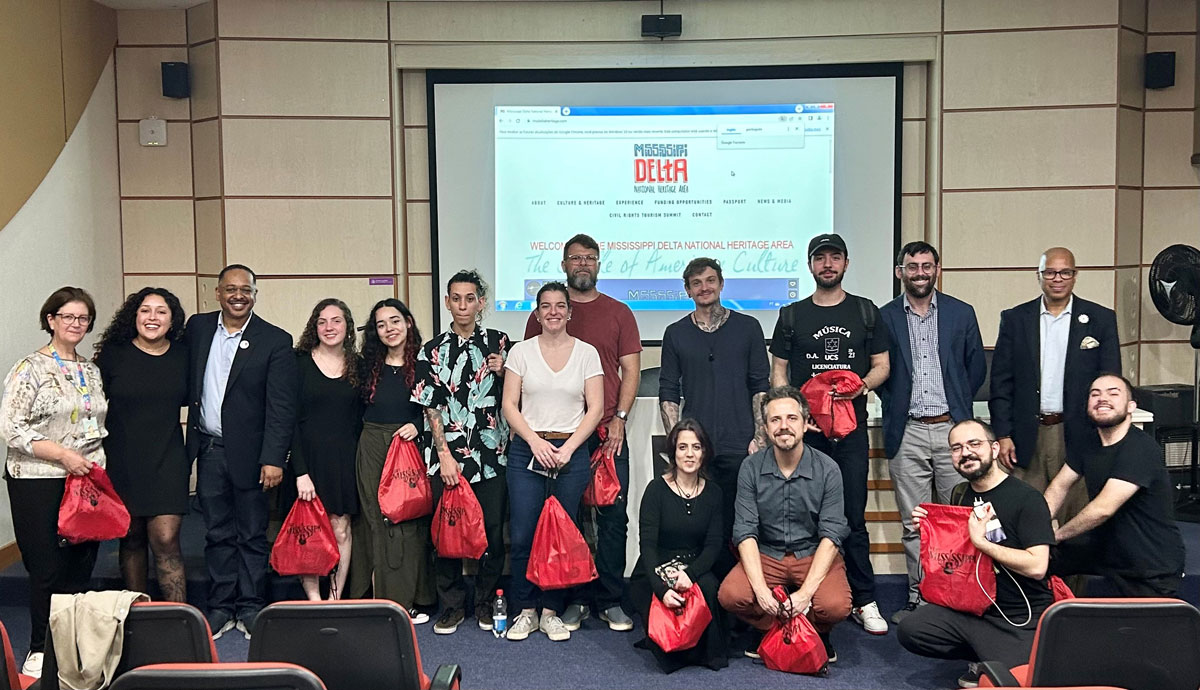
Ultimately, they figured out that they had a half-hour concert film that relates to the Delta and people who love gospel and blues music, so that is what they made in the end. The short film includes traditional gospel performances from the Coahoma Community College Concert Choir, blues singer Jontavious Willlis and former Delta State University students Tae’Angelo Carter and Kierra Robinson.
“Jontavious is great because I said, ‘Look, I know you’re primarily a blues performer, but for the purposes of this conference, we’re just going to focus on traditional gospel songs that have somehow influenced the blues or crossed into it,’” Mitchell said.
“There’s a moment in the film where … he started doing a gospel song and kind of looked at the choir, and they picked up the line. So you have this call-and-response, back-and-forth. It’s one of the great moments of the film.”
The Delta Delegation was able to facilitate a special screening and virtual Q&A between producers Ted Fisher and Don Allen Mitchell and the University of Caxias do Sul. Though the Brazilian students were not necessarily the biggest enthusiasts of gospel or blues music as a collective, Mitchell said it was interesting for Fisher and him to see the students make the connections between the two genres.
“What was really cool was that, sure enough, there was a call-and-response part of the film, and they started responding. It was just a kind of cool, natural, organic audience response that transcends American culture and Brazilian culture,” Mitchell recalled.
“I Want to Be At The Meeting: Sacred and Secular in the Mississippi Delta” is not available to the public yet, as the producers are hoping to show it at film festivals before it finds a permanent home in the coming months.
‘Culture That’s Within Them’
Dr. Rolando Herts is hopeful that the Delta Delegation will be able to bring some Delta residents to Brazil to attend the festival in person. Last year, it was an accomplishment to be able to beam in Ted Fisher and Don Allan Mitchell about their documentary, as it was something they had never done before.
“The music students there asked excellent questions. They were really paying attention. They were engaged. To know that that’s possible says … we may be able to create a space there for some kind of exchange,” Herts said.
After returning from last year’s festival, Herts presented plans to the Cleveland Bolivar County Tourism Commission about the city being honored for this year’s festival. And between Dockery Farms, the Grammy’s museum and Delta State University, he believes a lot of creative possibilities may arise.
“It blows a person’s mind, I think, if you’re from here and you go there. I think it does something to you when you can say, ‘Wow, there are people all around the world who value this place and this culture.’ That’s a huge self-esteem boost, which is something that we need for Mississippians, particularly people from the Mississippi Delta,” Herts said.
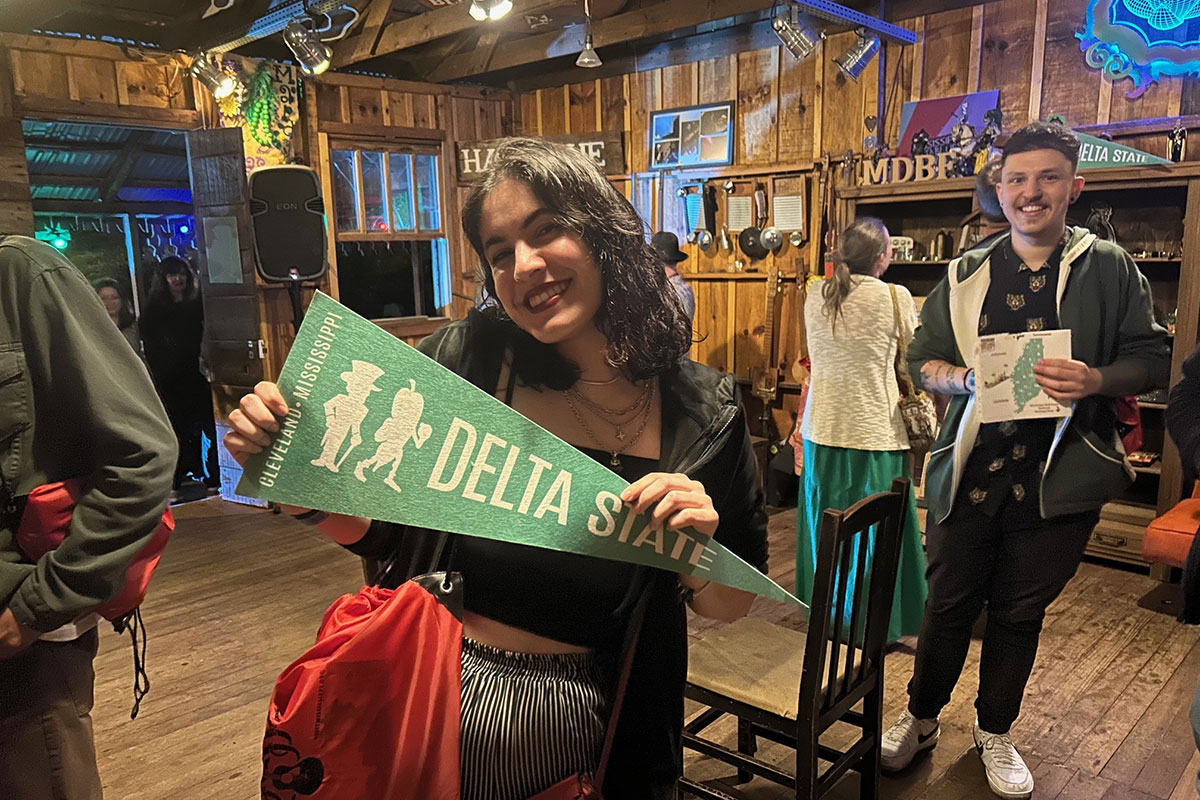
People talk down on the state of Mississippi, and the Delta is pelted with statistics and the narrative of being the poorest region in the poorest state when it’s so much more than that, the Delta Interpretive Center director said. There’s beauty, creativity and brilliance in the Mississippi Delta, and the people of that region should be proud, Hertz added.
“That is what I really believe this partnership can do as we continue to grow it,” he explained.
“We would like to see an opportunity for Delta State University students, Mississippi Valley State University students, Coahoma Community College students to go there and perform on a world stage and be appreciated for the culture that’s within them and what they represent.”
The 15th annual Mississippi Delta Blues Festival Brazil will be held in Caxias do Sul, Brazil on Nov. 21 to Nov. 23, 2024. To acquire tickets or learn more about it, visit mdbf.com. For more information on The B.B. King Museum and Delta Interpretive Center (400 2nd Street, Indianola) visit bbkingmuseum.org.
“I Want to Be at the Meeting: Sacred and Secular in the Mississippi Delta” is not yet available for general audiences. The film will be screened at the International Black & Diversity Film Festival in Toronto, Canada, on May 30 and May 31, 2024. The film has four nominations for “Best Short Documentary,” “Best Short Documentary-International,” “Best Musical Theme Film” and “Best Dance: Film / Video.” To learn more about the film festival or to donate, visit ibdff.net.
Read original article by clicking here.

